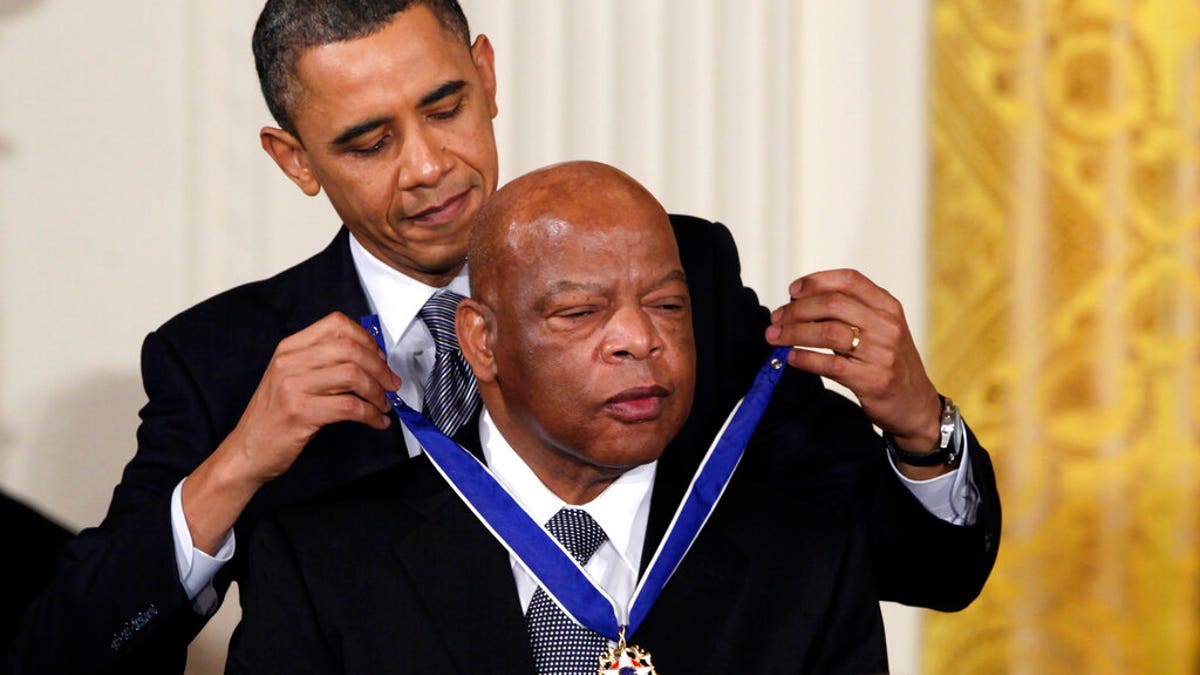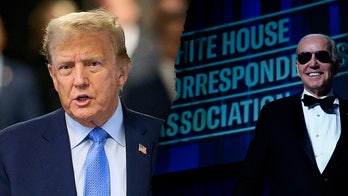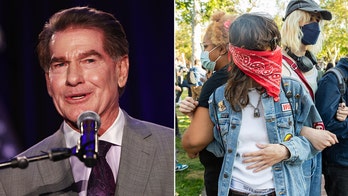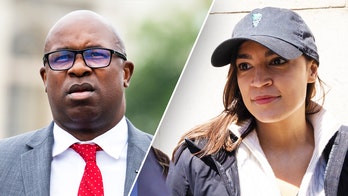Rep. John Lewis lies in state at the US Capitol Rotunda for public viewing
Trump National Diversity Coalition member Bruce Levell on the celebration of John Lewis.
You can hear the echoes.
They are all around us these days.
The U.S. Capitol is often an empty cavern during the pandemic. The congressional August recess, with only a few lawmakers in the building, augments the void.
No pulse of tourists, sweat dripping from their foreheads from D.C.’s summertime convection oven, teeming in the Rotunda or Statuary Hall. A handful of congressional aides are around. But they’re scant. The typical influx of summer interns was non-existent this year. No cabs pulling up outside the Rayburn House Office Building and a clown-car of lobbyists spilling onto the sidewalk off Independence Avenue.
You always hear the echoes in the Capitol when it’s empty. The stillness of the building at night is deafening. The sounds of silence are even louder now. Somehow, metaphysically, the tranquility of the place echoes off the marble floors and columns.
You hear different echoes when the House of Representatives is in session these days. Due to coronavirus, congressional health officials swing open most of the doorways leading to the House chamber. Especially doors on the third floor of the Capitol, leading to the press and public viewing galleries. This is an effort to ventilate the chamber during the pandemic. But it also means you can stand down the hall on rare days the House is in session and hear debate emanating from the chamber when you never would have heard those sounds before.

President Barack Obama presents a 2010 Presidential Medal of Freedom to U.S. Rep. John Lewis, D-Ga., during a ceremony in the East Room of the White House in Washington on Feb., 15, 2011. Lewis, who carried the struggle against racial discrimination from Southern battlegrounds of the 1960s to the halls of Congress, died Friday, July 17, 2020. (AP Photo/Carolyn Kaster, File)
Throngs of people absorb sound. And when no one’s around, you hear a lot.
During House debate, you can periodically hear the thunderous voice of House Majority Leader Steny Hoyer, D-Md., echoing through nearby stairwells. You hear the passion of House Minority Leader Kevin McCarthy, R-Calif. The sharp rap of the gavel, signaling the House coming into session or the beginning of a roll vote.
These are the new, COVID-19 soundtracks of the U.S. Capitol. The aural commotion of the chamber, caroming off the tile.
Ceremonies at the Capitol for the late Rep. John Lewis, D-Ga., amplified the silence of the Capitol during the pandemic.
The outbreak inhibited congressional officials from allowing Lewis to lie in state with members of the public filing by to pay their respects.
Thirty-two others preceded Lewis lying in state in the Rotunda -- ranging from President Ronald Reagan to President John F. Kennedy. A military honor guard hoisted Lewis’ casket atop the wooden platform known as the catafalque in the center of the Rotunda. But Lewis’s ceremony was like none other. A small contingent of friends, family and lawmakers dotted the perimeter of the Rotunda, socially-distanced, for the service.
We talk about the silence of the Capitol during this strange, unsettled period. But it was a recording of Lewis’ unmistakable, booming baritone, played at the end of the late congressman’s service, which left an indelible impression.
This is where echo came into play.
Lewis’ words, ricocheting not just through the cavernous Rotunda, but audible throughout the otherwise empty complex. The echoes served as a reminder that Lewis’s work remains unfinished.
“You must keep the faith and keep your eyes on the prize! That is your calling! That is your mission! That is your moral obligation! That is your mandate! Get out there and do it!” implored Lewis on the recording.
Entranced, the room fell silent for a moment. And with Lewis’ directive still reverberating, a shower of applause erupted from the mourners.
The applause reverberated throughout the Capitol. It sounded like a waterfall cascading through a cave. It’s doubtful the applause would have traveled much beyond the Rotunda had mourners squeezed in shoulder to shoulder to say goodbye to Lewis. But the vacancy of the Capitol produced this special echo. An acoustical acclimation for the late congressman.
Because of the pandemic, the honor guard took the unprecedented step of moving Lewis’ casket outside, under the Capitol’s East Portico, so mourners could bid farewell as they walked by. The service members then returned Lewis’ remains to the Rotunda for nightfall. They repeated the process the next day.
Some congressional aides and press often come by the Rotunda late at night when someone lies in state or honor. Just a smattering here and there. But Lewis died during coronavirus. For most of two nights, Lewis’ remains lay solitarily in the middle of the Capitol Rotunda with that military honor guard standing vigil. Virtually no one else was around.
When someone lies in state or repose in the Rotunda, an honor guard watches over the deceased, all night long, forming a square, alongside each side of the casket.
This goes on throughout the night, even if no one is there.
I’ve worked in the Capitol as a reporter for years now. I’ve been privileged to see a number of statesmen, lie in state or honor, in the middle of the night.
When someone lies in state or repose in the Rotunda, an honor guard watches over the deceased, all night long, forming a square, alongside each side of the casket.
In particular, I recall a Senate aide, around midnight one night in December 2012, sobbing at the edge of the Rotunda, as the late Sen. Daniel Inouye (D-HI) lay in state.
I will not forget that scene.
I also won’t forget the quiet. And the echoes.
There is rarely a more solemn scene in Washington than when an American icon is lying in state in the Capitol Rotunda, just before dawn. The building is especially hushed at that hour. But a sound sticks with you. An echo, naturally. The only thing you hear are the metallic clicking of the heels of the honor guard, periodically repositioning themselves around the casket.
The clicks of the heels are so precise that they sound like a metronome. Echoing on the House side. Echoing on the Senate side. Filling the void.
The echo signals loneliness. But an echo, in a yawning gully of a building like the U.S. Capitol is a signal. It means that someone else is there. Someone else is stirring.
In this instance, watching over John Lewis.
The Capitol is pretty quiet these days. The pandemic cleared the place out back in late March. It’s sometimes eerie, seeing these gigantic, ornate spaces, constructed for public appreciation, now lying fallow due to coronavirus.
It will remain this way for a while. The Senate likely won’t hold a vote for another week-plus unless there’s a new coronavirus bill. The House won’t vote until the week of September 14 unless there’s a coronavirus package on which to consider. Things truly won’t return to normal at the Capitol until the pandemic lifts.
But despite the desolation, the echoes, even in a building as massive as the Capitol, means that someone else is there. Somewhere. You’re not alone.
Even during a pandemic.





